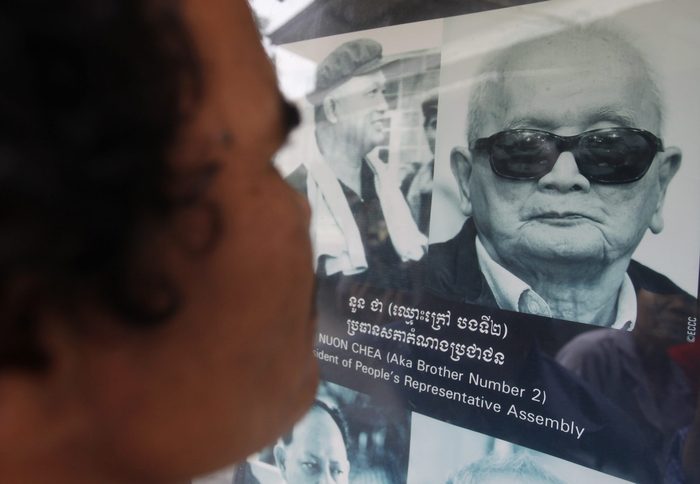Good morning, this is Kasmira. Proceedings for international crimes have no shelf life but their perpetrators do, posing problems when they are brought to the stand, often decades later, and their mental health has deteriorated. Lawyer Alain Werner says it’s time for a more unified approach among tribunals.
Briefing at the Palais yesterday, the UN refugee agency had strong words to express in reaction to the UK greenlighting its Rwanda deportation bill.
And a report from the World Meteorological Organization details the impact of climate disasters last year on Asia, the world’s most affected region. |

A photo of Nuon Chea, former Khmer Rouge deputy secretary of the Communist Party of Kampuchea on display at the Tuol Sleng Genocide Museum (S-21 prison) in Phnom Penh, Cambodia, 5 August 2014. Nuon Chea died in 2019, a year after a UN-backed court sentenced him to life in prison. (Keystone/EPA/Mak Remissa)
|
|
|
Bringing you the latest from UN press briefings in Geneva.
|
|
⛴BAD GLOBAL PRECEDENT.
The United Nations' high commissioners for refugees and human rights, Filippo Grandi and Volker Türk, called on the UK government to reconsider its plan to deport asylum-seekers to Rwanda after the controversial bill finally won approval from parliament in the early hours of Tuesday.
“The new legislation marks a further step away from the UK’s long tradition of providing refuge to those in need, in breach of the Refugee Convention,” said Grandi in a statement, noting that the arrangement, seeking to shift the responsibility, “sets a worrying global precedent”.
|
|
No wiggle room.
Speaking at the Palais later that morning, UN Refugee Agency spokesperson Matthew Saltmarsh added that the move would leave asylum seekers with limited room for appeal as the bill requires UK courts and tribunals to consider Rwanda a safe country and rules out challenges based on a claimed risk of refoulement or generic violations of human rights in Rwanda.
|
|
💔‘UNSPEAKABLE SUFFERING’.
The images of a premature baby being delivered from a dying mother’s womb on Monday following a series of strikes by Israel on Rafah this weekend is “beyond warfare”, Türk decried yesterday as he repeated his warning against a full-scale incursion on the southern Gaza city and called for an end to the “unspeakable suffering”.
|
|
Born in inhumane conditions.
“This is something that struck me as a woman, as a mother,” UN human rights spokesperson Ravina Shamdasani told reporters at the briefing, citing a report released by the UN Population Fund last week that estimates that around 180 women are giving birth every day in Gaza in “inhumane, unimaginable conditions,” many “probably through caesareans, without anaesthesia”.
|
|
The details.
The baby’s mother, Sabreen al-Sakani, her father, and three-year-old sister Malak were killed when their home was hit following intensified airstrikes on Rafah that Palestinian authorities say have mainly killed women and children. “Every 10 minutes, a child is killed or wounded. I’ll let you calculate how many children must have been killed or wounded since this briefing began today,” Shamdasani said.
|
|
Other events.
Reports of mass grave discoveries by Palestinian civil defence members outside Nasser and al-Shifa hospitals containing hundreds of bodies following Israeli operations there in previous weeks prompted a reaction from Türk, who said he was “horrified” at the facilities’ destruction and called for an independent investigation.
|
|
Disputed.
Israeli Defense Forces said the claim it's forces buried Palestinian bodies "is baseless and unfounded.” In a statement Tuesday the IDF did say that during an operation near Nasser hospital in February, troops "examined" bodies buried by Palestinians "in places where intelligence indicated the possible presence of hostages". As to the attacks on Rafah, it insists that it does not target civilians. Israel has vowed to launch a ground offensive against Hamas despite international calls for restraint.
|
|
Here's what else is happening
|
|
GS news is a new media project covering the world of international cooperation and development. Don’t hesitate to forward our newsletter!
Have a good day!
|

|
|
Avenue du Bouchet 2
1209 Genève
Suisse
|
|
|
|








